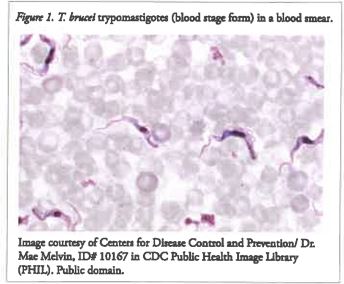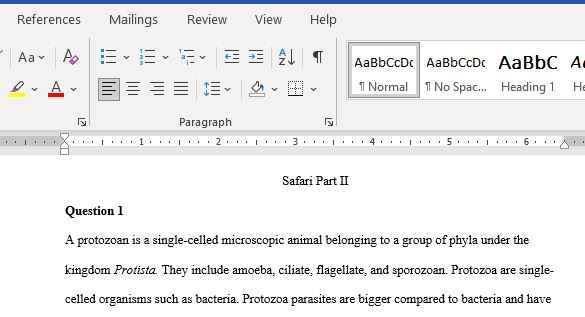What Is a Protozoan How Is a Protozoan Parasite Different from Bacteria and Multi-Celled Parasites Such as Intestinal Worms
Title: What Is a Protozoan. How Is a Protozoan Parasite Different from Bacteria and Multi-Celled Parasites Such as Intestinal Worms
Part II – Diagnosis
Because Robert had spent much of his time outdoors in an area of the world where the Anopheles mosquitoes that transmit malaria are common, the doctors immediately suspected he had contracted malaria. His symptoms matched those generally expected of people with malaria, but to confirm the diagnosis doctors collected a blood sample from Robert to analyze for the presence of the Plasmodium falciparum parasites that cause the disease.
When doctors looked at Robert’s blood smear under a light microscope, they did not see any malaria parasites. However, they did make a startling discovery.
“I found Trypanosoma brucei parasites in the patient’s blood,” one of the doctors remarked.
“What is Trypanosoma brucei?” asked a nurse. “Is it a type of malaria?”
“Trypanosoma brucei is a protozoan parasite. It is not closely related to Plasmodium falciparum genetically, but there are many similarities in the way it infects people and in the symptoms it causes. The disease caused by Trypanosoma brucei, called African trypanosomiasis, is also known as African sleeping sickness. All of the patient’s symptoms are explained by this diagnosis.”
Use the sources below to learn more about African trypanosomiasis.
- “Parasites-African Trypanosomiasis,” Centers for Disease Control and Prevention http://www.cdc.gov/parasites/sleepingsickness/
- “Trypanosomiasis, African,” World Health Organization (WHO) http://www.who.int/topics/trypanosomiasis_african/en/
After thoroughly investigating these and other relevant sources, answer the questions below.
Questions
- What is a protozoan? How is a protozoan parasite different from bacteria and multi-celled parasites such as intestinal worms? How does T. brucei differ from the closely related American trypanosome T. cruzi, the causative agent of Chagas disease, and from the P. falciparum parasite that causes malaria? Describe notable differences in morphology, life cycle, infectivity, transmission, geographical range, disease presentation, and treatment.
- How do people become infected with T. brucei? What are the risk factors as far as behavior, lifestyle, and geographic location?
- What are the clinical manifestations and symptoms of African trypanosomiasis? Compare and contrast these with the symptoms of malaria.
- Why does T. brucei infection cause the symptoms that led to the term “African Sleeping Sickness”?
- How is T. brucei infection diagnosed? What factors often make diagnosis difficult?
Answer Preview For What Is a Protozoan How Is a Protozoan Parasite Different from Bacteria and Multi-Celled Parasites Such as Intestinal Worms
Access the full answer containing 296 words by clicking the below purchase button


